|
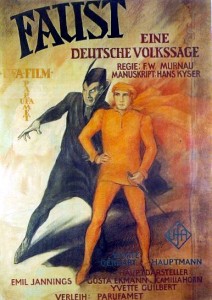
Synopsis:
In medieval Germany, the demon Mephistopheles (Emil Jannings) bets an archangel (Weiner Fuetterer) that he can corrupt the soul of a well-meaning alchemist (Goesta Ekmann). After experiencing a trial day of omnipotence and youth, Faust (Ekmann) accepts Jannings’ pact in order to romance the “most beautiful woman in the world” (Hanna Ralph); when he eventually falls in love with a chaste young maiden (Camilla Horn), however, Mephistopheles plots their downfall.
|
|
Genres, Themes, Actors, and Directors:
- F.W. Murnau Films
- Pact with the Devil
- Silent Film
Review:
Loosely based upon the first part of Goethe’s play of the same name, F.W. Murnau’s Faust remains one of his most visually evocative films, with consistently atmospheric cinematography by DP Carl Hoffman, effectively stylized sets, and fine special effects. From its stunning opening sequences — wherein an archangel and Mephistopheles use Faust as a pawn in a wager against one another, and Mephistopheles unleashes a plague upon Faust’s village — we are immediately invested in Faust’s sticky existential dilemma. Dr. Faust (nicely played in both old age and youth by Goesta Ekmann) initially accepts Mephistopheles’ proposal in desperate hopes of finding a way to heal his plague-ridden neighbors — but the fearful townsfolk immediately discern that Faust is in league with the devil, and want nothing to do with his ill-gotten cures. From thence, Faust’s foolhardy decision to accept Mephistopheles’ offer of further omnipotence and youth is much less easy to swallow; at this point, we understand that, despite his originally noble intentions, Faust has squarely dug his own grave.
The film’s middle scenes — as Faust explores a life of hedonism, then becomes smitten by a fair maiden, while Mephistopheles himself flirts with the maiden’s mother (Frida Richard) — are often noted as its least compelling, perhaps in part because the imagery is no longer quite so consistently stunning; by the film’s final tragic act, however, the momentum and visual interest have picked up once again. Interestingly, it’s Mephistopheles himself (played with impish glee by Jannings) who emerges as the film’s most memorable character. We’re reminded time and again that Faust’s entire journey is predicated upon Mephistopheles’ whims: once Mephistopheles decides that Faust has made a mistake in falling for Gretchen (Horn), he quickly sets the wheels in motion to “help” Faust see the error of his ways. By the end of Faust’s bitterly tragic saga, we come to believe that any type of consort with the devil is truly a compromised bargain: there is no room for goodness or humility once one has crossed over to the Other Side.
Note: Interestingly, in his “Greatest Films” review, Roger Ebert points out that Faust is ranked by IMDb users as one of the top horror films of all time (even placing it above Murnau’s more widely recognized, Dracula-themed Nosferatu); however, I’m not quite sure I would label it within that genre myself, as it’s less a horror film than a morality/folk tale.
Redeeming Qualities and Moments:
- Carl Hoffman’s stunning cinematography
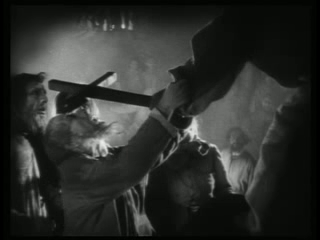

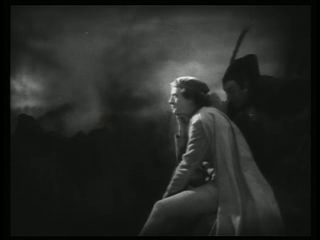
- Excellent early special effects
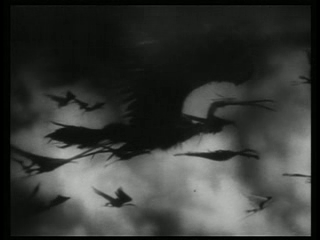
- Countless memorable images


- Fine expressionistic sets
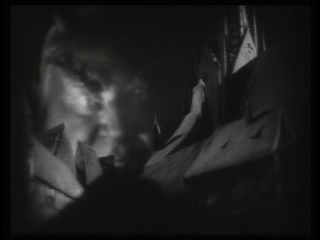
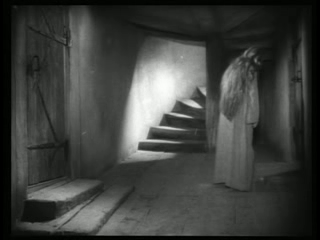
Must See?
Yes, as an acknowledged silent classic by a master filmmaker. Listed as a film with Historical Importance in the back of Peary’s book.
Categories
Links:
|









One thought on “Faust (1926)”
A once-must, as a classic example of German silent cinema.
First viewing.
One of the drawbacks of seeking out silents is that, quite often, one has difficulty finding a quality print. For many of us ffs, silents already present a challenge simply because they are silents. Tack a bad print on top of that and things become even more challenging. For me, ‘Faust’ is a case in point. I found a print on YouTube which is so bad that I could not watch more than a few minutes. (An added ‘danger’ exists in that a bad print of a silent can perhaps result, wrongly, in a bad opinion of a film.)
Undeterred, I went elsewhere in search of a better print. Luckily, Kino has released ‘Faust’ on DVD in a print of rather good quality. I say ‘luckily’ not only because of that quality but also because I discovered that it’s quite a marvelous film. In fact, it’s a rather stunning visual achievement.
It’s been said that Murnau has always favored imagery over story. I can’t seem to see it that way; to me, his films seem to divide equal attention to both elements. With ‘Faust’, it may seem as if the story is of lesser concern – but that seems to have more to do with how the script is constructed. The character of Faust is placed in a few different situations, and they don’t seem to have a clear, direct thread between them. But such a thread doesn’t seem the point. What is to the point is the simple fact that Faust has sold his soul to Mephisto (as the latter is called in the Kino print). We then witness how that pact plays out. So the specifics become secondary.
It just dawned on me that describing some of the unique imagery in ‘Faust’ could spoil its power. It really just needs to be seen. I will say there’s much that runs along lines that one expects from German expressionism – and I couldn’t help but notice certain breathtaking early moments that seem to echo later through the ‘Night on Bald Mountain’ segment of ‘Fantasia’.
You may simply not believe that younger and older Faust are played by the same actor; the difference is astonishing. By contrast, Horn’s role is rather unshowy but quietly effective and ultimately haunting. In a surprisingly comedic section (which echoes James Whale’s sensibility in ‘Bride of Frankenstein’), Yvette Guilbert registers well as Horn’s aunt. FFs will want to note that Horn’s brother is played by an actor much better known as director William Dieterle.
As Mephisto, I also did not recognize Emil Jannings ~ at all. Here, in look and attitude, he seems a kind of odd combination of Otto Preminger and Divine’s character in ‘Pink Flamingos’ (I think it’s the eyebrows!). Jannings’ performance is a wild, unruly and yet cunning thing; basically like a good deal of what’s called for. His character is the embodiment of what we have come to believe evil would be like if personified. Myself, when I think of ‘Evil’, I think more along the lines of the senseless Leatherface in ‘Texas Chainsaw Massacre’. But, in ‘Faust’, it’s at the same time made clear that we mostly see Mephisto as something of a human incarnation of a larger evil (as note the opening scenes).
I agree that ‘Faust’ is not a horror film. It is, however, dark, moody, and marvelously visual throughout – a cinematic experience no devoted ff can afford to miss!